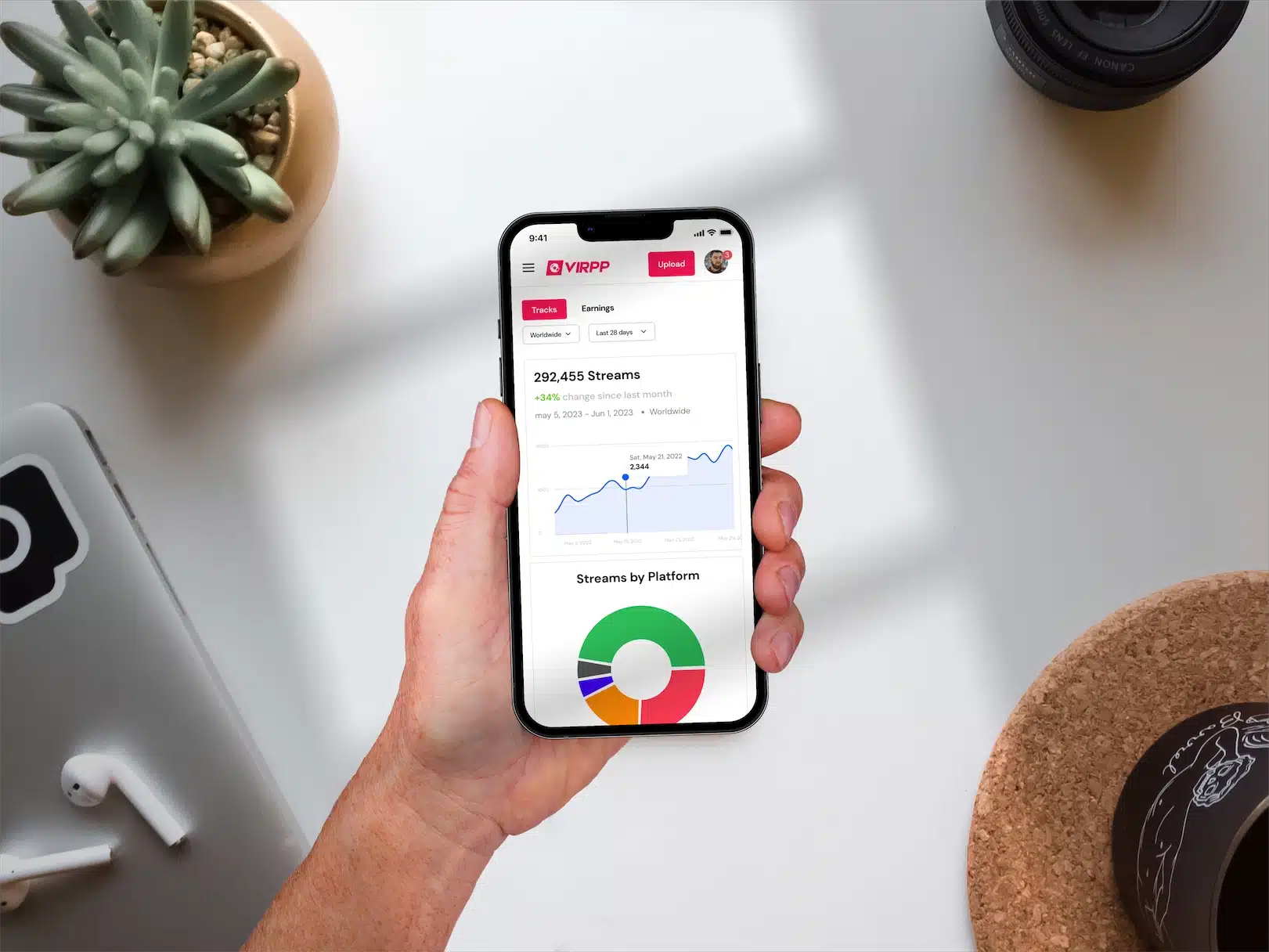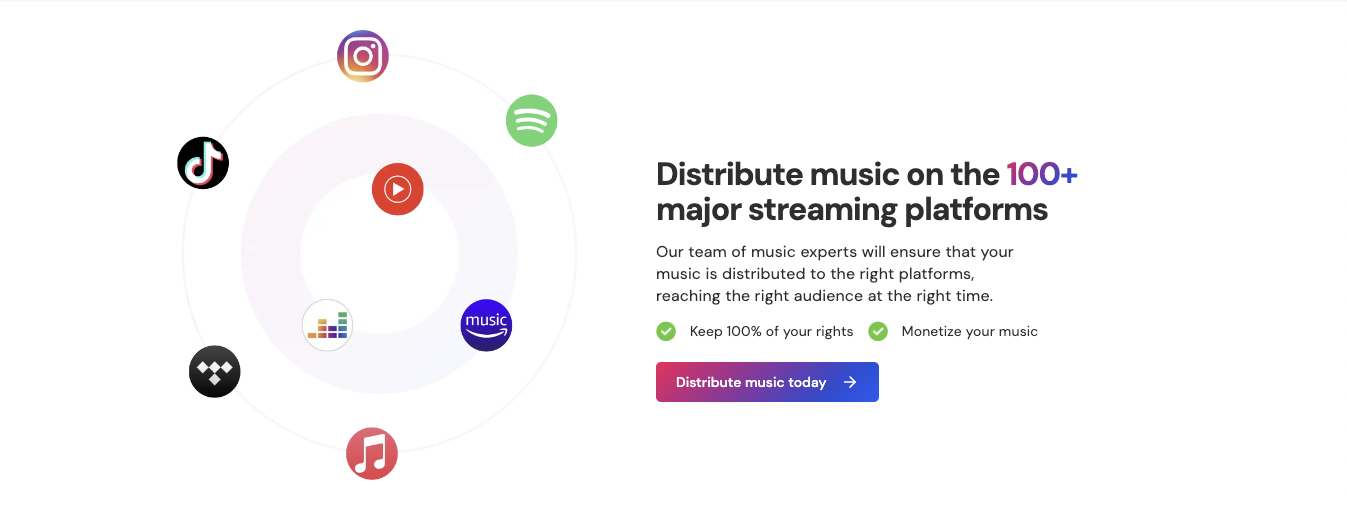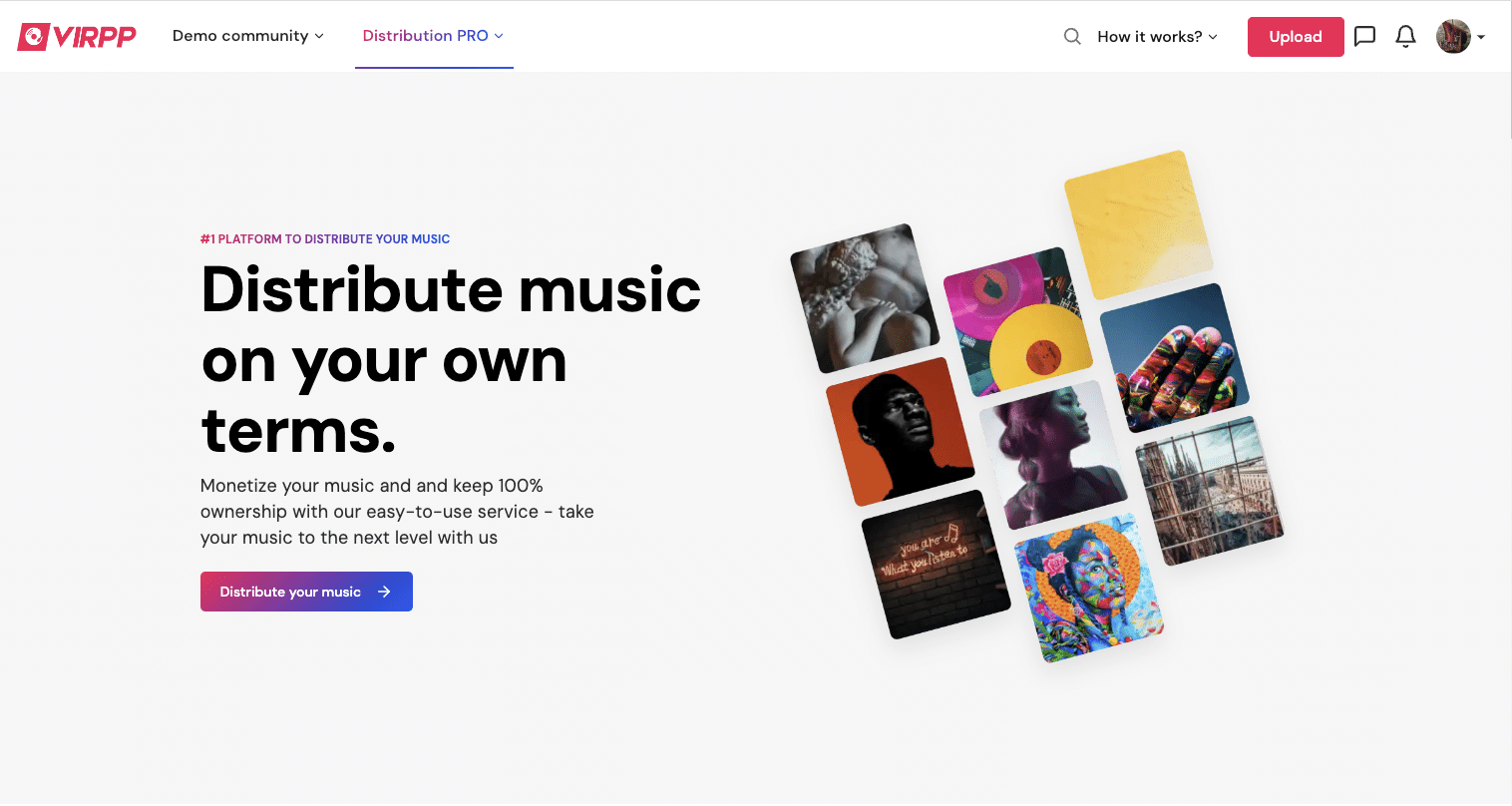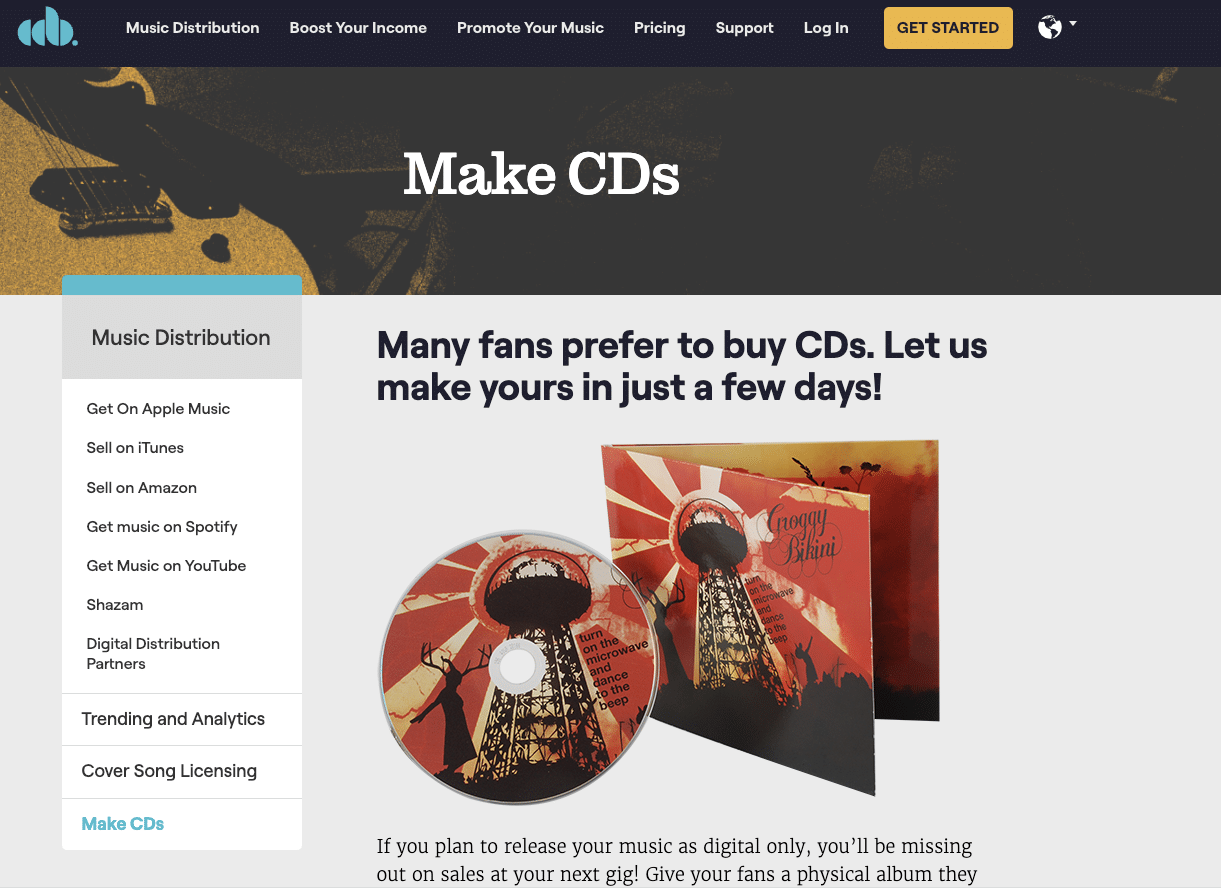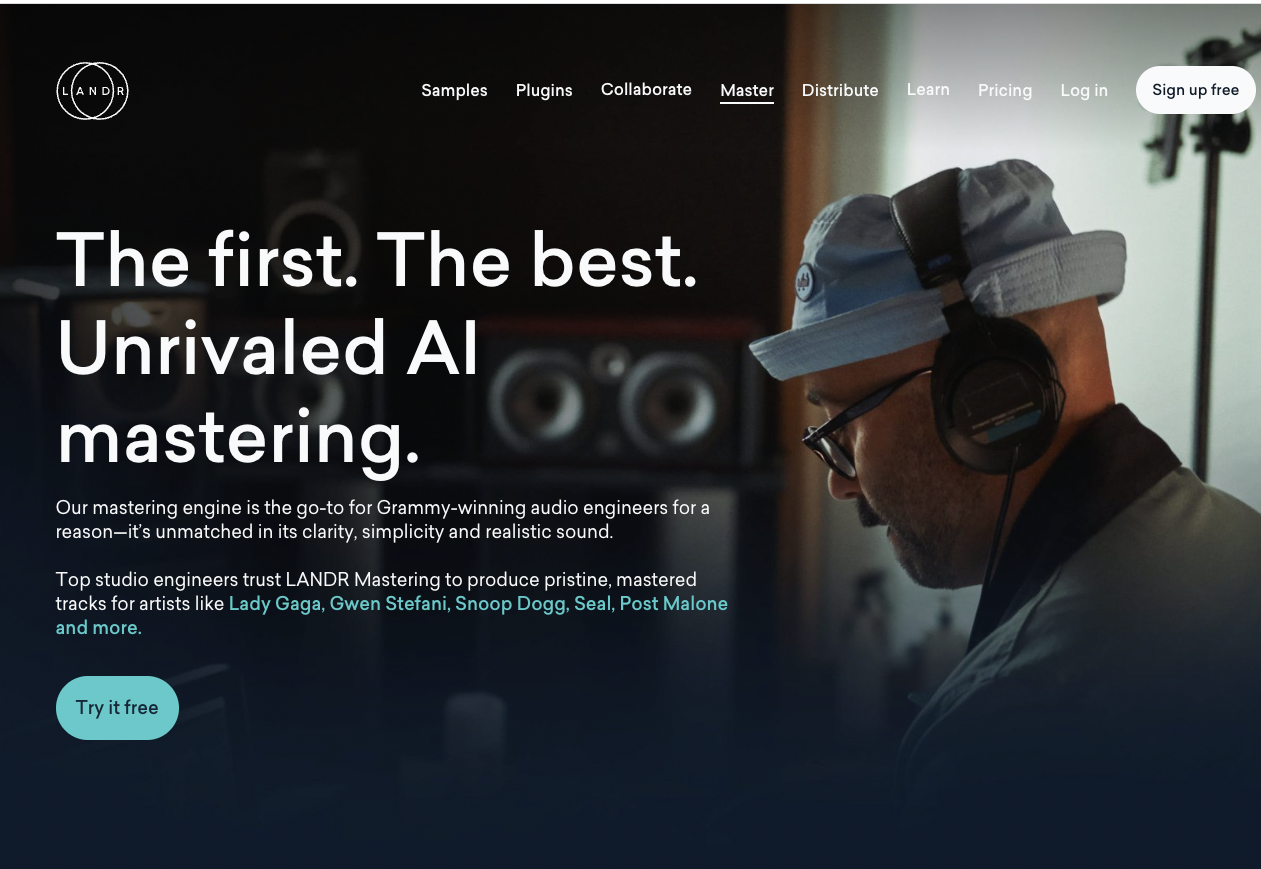Discover the Top 10 Music Distribution platforms for Your Music in 2023.
Music distribution has come a long way, empowering artists to independently release their music without relying on traditional record labels. With a multitude of music distribution services available, choosing the right one can be overwhelming. In this article, we will compare the top 10 music distribution services of 2023 that are guaranteed to help independent musicians and producers distribute their music and grow their careers.
Discover the Top 10 Best Music Distribution Services of 2023
- VIRPP
- TuneCore
- DistroKid
- CD Baby
- Ditto Music
- AWAL
- Symphonic
- LANDR
- RouteNote
- Amuse
1. VIRPP: Emerging Artists’ Favorite in Distribution Services
Rapidly gaining popularity, this platform has swiftly become a favorite among emerging artists. VIRPP presents a unique opportunity for artists, wherein their music is sifted through an advanced algorithm. This algorithm efficiently determines factors such as production quality, moods, genres, and copyrights. Consequently, this ensures that only the cream of the crop, the best music, is released to a global audience comprising record labels, producers, fans, and fellow artists alike. By taking advantage of VIRPP, artists can not only have their demos heard but also distribute their music with remarkable ease. Thus, VIRPP is swiftly changing the music distribution landscape for the better.
Benefits of using VIRPP as music distribution partner:
- VIRPP employs an innovative algorithm that filters music based on production quality, moods, genres, and copyrights, ensuring that only the best music reaches a global audience of record labels, producers, fans, and fellow artists.
- Furthermore, artists can leverage VIRPP to gain valuable exposure and distribute their music effortlessly. This approach significantly offers a remarkable opportunity for emerging talents.
- Above all, with VIRPP, there are no hidden fees. This results in the best pricing available, providing yet another reason for artists to choose VIRPP for their music distribution needs.
2. TuneCore: One of the Leaders in the Music Distribution
TuneCore: TuneCore is a popular music distribution service that allows artists to distribute their music to over 150 digital stores worldwide, including Spotify, Apple Music, and Amazon Music.
Benefits of using Tunecore as music distribution partner::
- TuneCore boasts an extensive distribution network, encompassing popular streaming platforms such as Spotify, Apple Music, and Amazon Music.
- Artists can utilize TuneCore’s comprehensive tools to track sales and royalties efficiently, gaining valuable insights.
Disadvante of using Tunecore as music distribution partner::
- Some additional services offered by TuneCore, such as publishing administration and YouTube Sound Recording Revenue Collection, come with extra fees.
3. DistroKid: Affordable Distribution with Maximum Reach
DistroKid serves as the perfect platform especially for artists who are seeking an affordable, yet efficient avenue to distribute their music. Offering distribution across major platforms like Spotify, Apple Music, and Tidal, it significantly provides a holistic solution. Additionally, it comes with the provision for collaborative earning splits, thereby making it an even more practical solution for the modern musician.
Benefits of using DistroKid as music distribution platform:
- With DistroKid, artists can distribute their music to over 150 digital stores worldwide, including Spotify, Apple Music, and Tidal.
- DistroKid offers convenient earnings splitting options for collaborative projects, along with robust tools for tracking sales and royalties.
Disadvantage of using DistroKid as music distribution partner:
- The annual subscription fee for DistroKid is relatively higher compared to some other platforms.
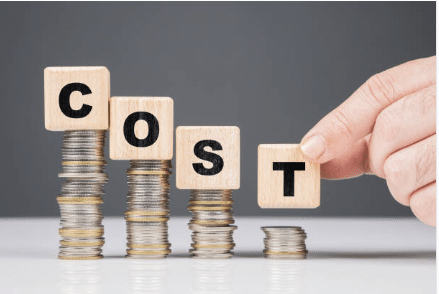
4. CD Baby: The Complete Package in Music Distribution
CD Baby: CD Baby CD Baby stands out with its dual offering of digital and physical distribution. Whether you’re targeting Spotify, Apple Music, or looking for CD and vinyl record distribution, CD Baby has you covered.
Benefits of using CD Baby as music distribution partner:
- CD Baby facilitates distribution to over 150 digital stores globally, including popular platforms like Spotify, Apple Music, and Amazon Music.
- Additionally, CD Baby provides physical distribution services for CDs and vinyl records, catering to a wider audience.
Disadvantage using CD Baby as music distribution partner:
- CD Baby may offer limited additional artist tools compared to some other platforms.
5. Ditto Music: Comprehensive Tracking
Positioned as an ideal solution, Ditto Music perfectly combines the elements of widespread distribution and efficient sales tracking. By providing access to an impressive network of over 200 digital stores, it essentially expands the artist’s reach. Furthermore, with the inclusion of dedicated tools explicitly designed for sales tracking, Ditto Music ensures that artists have a comprehensive and seamless solution for music distribution.
Benefits of using DistroKid as music distribution platform:
- Ditto Music enables artists to distribute their music to over 200 digital stores worldwide, including Spotify, Apple Music, and Tidal.
- Artists can leverage Ditto Music’s tools to monitor sales and track royalties, reaching diverse audiences.
Disadvantage of using Ditto Music as music distribution service:
- Ditto Music may have lower visibility compared to some other platforms, potentially impacting overall reach.
6. AWAL: Designed for Independent Artists
AWAL: AWAL is a music distribution service that is designed for independent artists. This platform allows artists to distribute their music to various streaming platforms and also provides tools for artists to track their sales and royalties.
Benefits of using AWAL as music distribution platform:
- AWAL focuses on empowering independent artists, providing distribution to various streaming platforms.
- Artists gain access to comprehensive tools for tracking sales, royalties, and analytics insights, enabling informed decision-making.
Disadvantage of using AWAL as music distribution platform
- AWAL may have limited physical distribution options.
7. Symphonic Distribution: Expansive Distribution
Symphonic Distribution: Symphonic Distribution. Artists can utilize this platform’s extensive reach across 200+ digital stores worldwide, ensuring their music’s visibility and effectively managing their sales and royalties.
Benefits of using Symphonic as music distribution partner:
- Symphonic Distribution facilitates distribution to over 200 digital stores worldwide, including popular platforms like Spotify, Apple Music, and Tidal.
- Artists can leverage Symphonic Distribution’s tools to track sales, royalties, and optimize revenue streams.
Disadvantage of using Symphonic as music distribution partner:
- Symphonic Distribution may have higher distribution fees compared to some other platforms.
8. LANDR: Music Distribution with Mastering Services
LANDR: LANDR differentiates itself by offering not just distribution services but also mastering services. It’s the perfect choice for artists looking to produce high-quality music and distribute it widely.
Benefits of using LANDR as music distribution partner:
- LANDR enables artists to distribute their music to various streaming platforms.
- Additionally, LANDR offers mastering services, simplifying the process of producing high-quality music before distribution.
Disadvantage using LANDR as music distribution partner:
- LANDR may offer limited additional artist tools compared to some other platforms.
9. RouteNote: Simplified Music Distribution
Switching to RouteNote, this platform offers a simplified solution for music distribution, enabling artists to distribute their music easily across various streaming platforms while keeping track of sales and royalties.
Benefits of using RouteNote as music distribution partner:
- RouteNote facilitates distribution to various streaming platforms, providing artists with an efficient way to reach their listeners.
- Using RouteNote’s tools, artists can track their sales and royalties efficiently, ensuring transparency in royalty reporting.
Disadvantage of using RouteNote as music distribution partner:
- Some additional services provided by RouteNote, such as YouTube Content ID and premium features, as a result come with extra fees.
10. Amuse: “Free” Music Distribution
Lastly, as a free distribution service, Amuse is an excellent choice for artists on a budget. It offers music distribution across different platforms and provides efficient tools for tracking sales and royalties. It offers music distribution across different platforms and provides efficient tools for tracking sales and royalties.
Benefits of using Amuse as music distribution partner:
- Amuse empowers artists to distribute their music to various streaming platforms, breaking barriers of costs.
- Artists can easily track sales and royalties using Amuse’s user-friendly tools.
Disadvantage of using Amuse as music distribution partner:
- Amuse may offer limited additional artist services compared to some other platforms.
Concluding Thoughts on the Leading Music Distribution Services of 2023
Selecting the right music distribution service can be the turning point in an artist’s career. With our list of the best music distribution services for 2023, you can distribute your music to a variety of streaming platforms and reach a broader audience. Amongst these, VIRPP stands out with its unique filtering algorithm and worldwide audience. So whether you’re an aspiring musician or a seasoned one, these services offer you the opportunity to strike the right chord with your audience.
In the era of digital music, distribution has undergone a significant transformation. The “best music distribution services” of 2023 have made it easier than ever for artists to get their music across to listeners worldwide. This is your chance to seize this opportunity and ensure your music reaches the audience it deserves.
What is Music Distribution?
Music distribution is the practice of getting an artist’s music from the recording studio to the listener. In the digital age, this process often involves working with digital service providers (DSPs) to ensure that music is accessible on platforms like Spotify, Apple Music, Amazon Music, and more.
What are Digital Service Providers (DSPs)?
Digital Service Providers, commonly referred to as DSPs, are platforms that play a crucial role in music distribution in the digital age. DSPs such as Spotify, Apple Music, Tidal, and others, deliver digital music content to listeners globally, acting as intermediaries between the artists and the audience.
How does releasing music work?
Music distribution works by partnering artists with distribution services that liaise with DSPs to get their music uploaded and available for streaming or purchasing. Once an artist’s music is on a DSP, it becomes available to a global audience, significantly enhancing the potential reach and revenue for the artist.
What are music rights in distribution?
Music rights in distribution refer to the rights that a music rights holder (usually the artist or record label) has when their music is distributed. These rights include mechanical rights (rights to reproduce the music), performance rights (rights to perform the music), and sync rights (rights to synchronize the music with visual media).
What are the Legal Aspects ?
The legal aspects of music distribution are vast and involve understanding copyright laws, protecting music rights, and interpreting music contracts. It’s crucial for artists to comprehend these elements to protect their music and ensure they’re appropriately compensated.
What are the copyright laws ?
The copyright laws for music distribution protect the rights of the music creators, ensuring they’re paid when their music is reproduced, distributed, or performed publicly. Different territories have different copyright laws, so it’s essential to understand these laws in your region.
How to protect your music rights?
Protecting your music rights involves registering your music with a copyright office, understanding and negotiating your contracts carefully, and keeping detailed records of your work. You may also want to consider joining a PRO (Performance Rights Organization) to ensure you receive royalties when your music is performed publicly.
What are the legal implications of music contracts?
Music contracts have legal implications in terms of copyright ownership, royalty distribution, and terms of agreement between artists and record labels or distribution services. It’s vital for artists to understand these contracts and seek legal counsel if necessary before signing.
How much money can I earn with best music distribution?
Earnings through music distribution rely heavily on several intertwined elements, primarily including the number of streams or purchases, the diverse platforms where your music is distributed, and the specific agreements you have secured with your distribution service or record label. In the current digital age, an upward trend has been observed with the rise of streaming platforms. Consequently, artists are now empowered with the capability to earn revenue each and every time a fan or listener streams their music.
